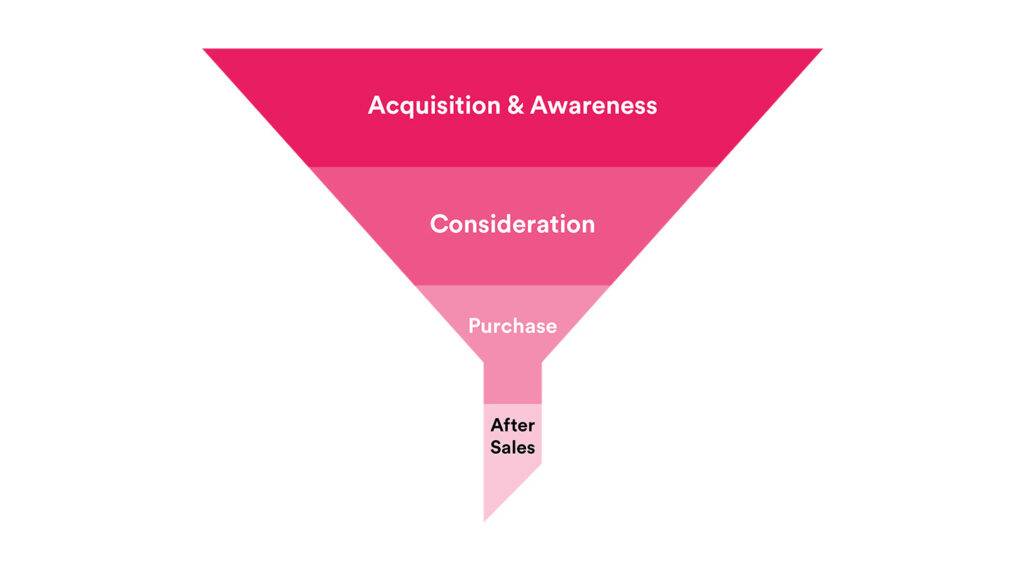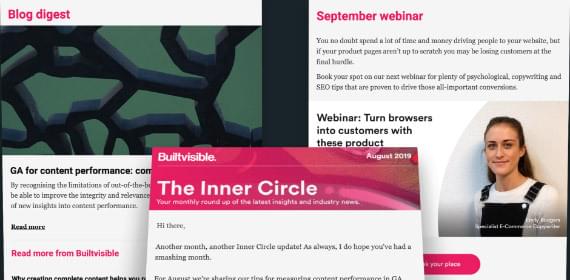Top-of-funnel
At this stage of their journey, users will often know little to nothing about your business. So, we need to find a way to pull them into your ecosystem. When doing so, we need to ensure their experience on your website is best-in-class, so their encouraged to stick around – and hopefully convert.

Here are some of the most popular upper funnel goals, and the SEO teams who can help you achieve them.
Improving site health and performance
Your organic growth is reliant on strong technical foundations. One of the first things you can do is conduct a thorough technical examination of your site to identify any issues hindering your performance in organic search results. Whether someone within your organisation does the technical SEO audit or you outsource it to an SEO agency, you need to make sure the individual carrying it out is a technical SEO specialist with the right expertise. They should be capable of reviewing and providing actionable recommendations on technical aspects such as:
- site architecture and internal linking
- page speed and Web Vitals auditing
- PWA/JS rendering /Advanced web technologies
- international targeting
- mobile SEO
Ideally, the team will know how to conduct a Log file analysis, too. Logs allow you to understand how Google is interacting with your site, and how the site is responding to these requests. This can be extremely useful in the discovery of issues, when gauging their severity and also when quantifying the impact of fixing them.
If you want to know what a good technical audit looks like, have a look at what our Technical Director, Will Nye, raises in this post.
Protecting your site from algorithm updates
Technical SEO auditing is really important if you want to maximise the success of your content and digital PR strategies but a good technical audit will also help protect your site against any potential algorithm updates. These can have a significant impact on your website’s organic traffic and rankings. So if you want to avoid losing visibility and revenue, you need to know how to address weaknesses by carrying out a thorough technical SEO audit on your website.
Building brand awareness online
There are a number of tactics that can be considered when it comes to building brand awareness online. In fact, this is something that a number of teams can assist with. Three of the most popular tactics include:
Link building
This tactic involves getting your brand seen on websites, news sites and other places where your audience is active online. Digital PRs are the masterminds behind executing strategy-led campaigns and other link building tactics (outreach, competitor intersect, etc.) that can help improve your brand awareness.
Local SEO
If you’re a large, multi-location brand or service provider, taking control and managing your local properties, increasing your local SEO presence can be key to generating growth revenue from organic search. With local SEO, you can ensure your brand is front and center when your audience needs a supplier in their local area. Some key activities local SEO experts will conduct are identifying opportunities, optimising local pages and getting your Google Business Profile set up correctly.
Editorial content
Creating content for a blog or content hub is something a lot of digital marketers and content creators may feel comfortable with. However, very few reap the benefits of this investment. This is why working with a specialised content team is so important. Content strategists have a data-led approach that looks at the whole funnel journey and connects the dots.
Middle-of-funnel
Middle-of-funnel (MOF) search involves providing potential customers with the right information before they are ready to make a decision. In this consideration phase, they need to feel sure that yours is the only brand that matters.
Increasing engagement with your content
Creating content is easy. Creating content that resonates enough for your audience to take an action is not. By working with a content team, you can identify meaningful ways a page can be optimised to get the desired outcome from your customers.
Search intent
The first thing you need to do is ensure that your on-page content provides the information your users are searching for, as this is what Google will rank highly in the SERPs. A keyword mapping project will help you ensure your website’s pages are answering the question put into search queries by users.
An effective keyword mapping strategy will not only ensure you rank better but will also help you improve your conversion rates, as every new visit is another chance to convert. Typically, this task can sit within the technical SEO or content teams, or it could be done in tandem by both teams.
Content optimisation
This is the process of analysing and rewriting content that is underperforming on a page. Content strategists help you identify these pages and provide data-led, expert recommendations that will improve the overall page performance.
Tone of voice
Sometimes brands get caught up in the details of the product that they forget to speak to their audience in a way that resonates with them. Working with a copy specialist to establish a clear and engaging tone of voice that’s accessible for your audience is absolutely key to building a connection.
Becoming an authority in your niche
There are a number of ways to establish yourself as an authority in your industry through SEO. Two of the most popular tactics involve quality content creation and gaining quality links. It seems simple, but when it comes to the consideration phase of the sales journey, it’s the marginal gains that lead to conversions.
Content creation
Completely understanding the questions and concerns that your customers might have at this stage of the journey is vital. In order to be an authority over competitors, strategic copywriting should answer customer questions better than anyone else.
Authoritative links
Digital PRs can help you secure links in respected publications. When this happens, link equity flows from that site to yours and in turn, signals to Google and your customers that your site is one that can be trusted.
Improving the user journey on your site
Optimising for site speed:
Optimising your site for Core Web Vitals (CWV) can aid conversions to your site. You can provide the best content in your industry but if it’s hidden behind slow pages, visitors won’t wait around to see it.
As site speed is a ranking factor, this will also have a positive impact on rankings and visibility, and ultimately help bring more traffic to your site.
As well as conducting page experience audits regularly, the user experience should be factored into the mindset of your technical SEO team, too. Focusing on enhancing how users interact with your site is the way to go if you want to future-proof your digital marketing strategies against search engine updates.
Optimise your internal linking structure
Internal linking is one of the most impactful ways to improve organic search visibility while also adding value to your customers journey. Not every user is in the same stage of the buying cycle when they land on your website and some might need a little more research before they convert. Having a strong internal linking structure will help your users reach the page they need, while reassuring them that you’re the best option. Hopefully, this will then end in a conversion.
Your technical SEO experts should be able to identify quick wins within your internal linking strategy that will improve the user experience whilst optimising your site in order to boost your conversions.
Unlock on-site search opportunities
Improving your internal search configuration can also help you increase your sales (and therefore, revenue). Ask your technical SEO experts to look at your internal search data from Google Analytics (or any other analytics platform you might use). This allows you to identify what users are searching for and what products are being returned in each case. In turn, you can identify potential issues, such as users struggling to find certain information and therefore relying on internal search. You can find out more details about how to do this in this article.
Bottom-of-funnel
Besides including transactional keywords at the bottom of the funnel, there are still a few things you can do at the far end of the customer journey to ensure you maximise your site for sales.
Optimise your transactional pages for conversions
A good place to start is ensuring your transactional pages – such as product or category pages if you are an ecommerce site – are optimised for conversions. Ideally, this type of page template analysis should be carried out by your content, UX and technical SEO teams in conjunction, as all of these aspects will have a direct impact on sales.
The content team will make sure the content on the pages is geared towards conversions, whilst the UX team will focus on design elements to improve the user-friendliness. Then, the technical SEO team will embed these practices to ensure the templates are compatible with search engines and follow search engines guidelines.
Target transactional keywords
It’s undeniable that keyword research should be at the core of every SEO and PPC strategy. However, we rarely see SEO and PPC teams sharing their keyword research data with each other. Google Ads contains levels of data that an SEO team can only dream of. Commercial data such as keyword competition, conversion rates and revenue figures can be used by SEO teams to adjust keyword-targeting strategies in order to focus on driving revenue over traffic.
For example, it could make sense for your SEO team to test re-optimising pages in order to target keywords that have lower search volumes but which convert much more effectively.
On top of this, there are many other ways your PPC and SEO experts can team-up to find efficiencies and maximise your marketing impact. It doesn’t matter if separate external agencies are in charge of that, they still can – and should – work together to reap greater return from your existing marketing efforts.
Strong trust signals
Customers need to feel comfortable before making the final decision to buy your product or service. One way to do this is by conducting an audit which looks at ways you can improve E-E-A-T signals This project should be carried out by a content strategist who looks at customer reviews, payment security, citations and more.
Page analysis
This process often involves conducting an analysis where the content and design are analysed against competitors. Content strategists typically provide detailed recommendations that involve working with design teams to ensure the best possible outcome.
Achieve your goals with a partner who understands
As you can see, SEO goals come in many shapes and sizes. From building brand awareness to closing new business. Whatever your goals may be, Builtvisible has a long history of working with clients to ensure they are at the forefront of the work we do. This is all packaged up in precision reporting to show the fruits of our labour.
When you are ready to set and achieve your online goals, get in touch with us to learn how we can help you do just that.
